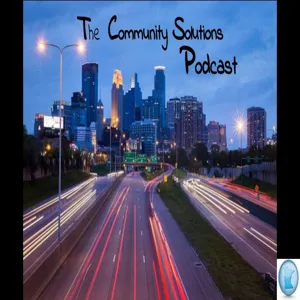Podcast Summary
Refreshing your home and wardrobe for spring: Clorox Scentiva cleans effectively while adding a tropical scent, JCPenney offers stylish clothing for all body types, and the NBA playoffs bring excitement and intensity to the postseason.
Clorox Scentiva not only cleans effectively like Clorox but also adds a refreshing coconut scent to make your home feel like a tropical getaway. Meanwhile, JCPenney offers stylish and comfortable clothing options for various body types, allowing everyone to refresh their wardrobe for the spring season. Additionally, the NBA playoffs represent the excitement and intensity of the postseason, and the distinction between sex and gender, as discussed in the Psychology Podcast episode with Dr. Anne Fausto Sterling, is a complex issue influenced by both biology and culture.
The Intersection of Feminism and Biology: A pioneering feminist scholar challenged biological arguments against women's rights and equality using her scientific background, leading to influential work in science and technology studies.
The intersection of feminism and biology, as explored by the legendary feminist and scholar, became a pivotal area of study in the late 1960s and early 1970s. This retired professor of biology and gender studies, who started the gender studies program at Brown University, used her scientific background to challenge biological arguments against women's rights and equality. The professor, who was active in the anti-Vietnam War and civil rights movements, noticed the recurring use of biology as an argument against feminism and felt compelled to investigate its validity. Her groundbreaking book, "Myths of Gender," which debunked various biological claims used to justify gender inequality, remains relevant today. Despite advancements, some of the arguments still persist, but the professor's work has influenced the way we view science and its relationship to our cultural context. Her pioneering work in science and technology studies continues to shape our understanding of the intersection of science, culture, and gender.
The Evolution of Terms Related to Sex and Gender: From 'invert' and 'transvestite' to 'gender identity', terminology around sex and gender has changed significantly, with pioneers like Krafft Ebing, Havelock Ellis, John Money, and Robert Stoller playing key roles in the shift in understanding and language.
The understanding and classification of terms related to sex and gender has evolved significantly throughout history. At the turn of the 20th century, sexologists like Krafft Ebing and Havelock Ellis grouped various sexual expressions under the umbrella terms of "invert," "transvestite," and "eonist," considering them abnormal or unhealthy forms of development. They did not distinguish between cross-dressing and gender identity. The term "gender identity" did not enter the conversation until the 1950s and 1960s, when John Money and Robert Stoller felt the term "sex" was too ambiguous and introduced "gender" as a psychological term and "identity" as a way to describe one's sense of self. These pioneers in the field contributed to the shift in understanding and language around sex and gender.
The emergence of gender identity as a diagnostic category in the late 1960s: The DSM, first published in 1952, played a significant role in pathologizing gender nonconformity by including 'gender identity disorders' in the 1980s, which has since evolved and is predicted to be removed in future editions.
The concept of gender identity as a distinct term and diagnostic category emerged in the late 1960s and gained prominence in the 1980s, largely due to the influence of the psychiatric community and their diagnostic manual, the DSM. Prior to this, the term "gender" was used more broadly, but without the specific focus on identity. In the 1980s, terms like "gender identity disorder" began to appear, which pathologized gender nonconformity. This was part of a larger struggle for authority over mental health diagnoses and treatments, with insurance companies and psychiatrists seeking to standardize and control the definition and diagnosis of mental illnesses. The DSM, first published in 1952, became a key tool in this effort. The inclusion of homosexuality in the DSM in the 1970s led to a push to remove it as a mental illness, which was successful by the third edition of the DSM in 1980. However, the diagnosis of gender identity disorders persisted and was used to diagnose children whose gender expression did not align with societal expectations. This diagnosis has undergone numerous changes in classification and definition over the decades, and it is predicted that it will be removed from the DSM in future editions. Overall, the emergence and evolution of the concept of gender identity as a diagnostic category reflects larger societal attitudes towards gender and mental health.
The Evolution of Transgender and Transsexual Identities: Recognizing the fluidity and complexity of gender identities, transgender became more commonly used than transsexual around 2011, and nonbinary expanded the transgender umbrella. The speaker's provocative essay proposes five sexes, emphasizing the ongoing evolution of language and understanding in gender identity.
The understanding and definition of transgender and transsexual identities have evolved significantly over the past few decades. Transsexual was the predominant term until around 2011, when transgender became more commonly used due to the shift in focus from sex to gender identity. Additionally, the concept of nonbinary has gained popularity, expanding the transgender umbrella to include a broader range of identities. The speaker, who wrote a book proposing the existence of five sexes, clarified that the essay was meant to be provocative and ironic, and they are currently working on a more continuous theory of gender development. Overall, the discussion highlights the importance of recognizing the fluidity and complexity of gender identities and the ongoing evolution of language and understanding in this area.
Biology and culture influence each other in human development: Biology and culture are interconnected, influencing each other in various ways, including hormonal changes and motor skill development.
Sex and gender are not distinct entities but rather interconnected aspects of human development. Biology and culture influence each other, and gender can shape the biology itself. For instance, hormones like testosterone are not constant markers but change with behavioral context and cultural norms. Similarly, physical practices like throwing a ball can lead to gender-specific motor skills development. These examples demonstrate that biology and culture are not separate entities but constantly interact and influence each other. The speaker also emphasizes that there are few, if any, purely biological or cultural phenomena, and that even our beliefs and practices can become physically ingrained through neuromuscular responses. This perspective challenges the traditional view that sex is solely about reproductive function and that gender is a social construct. Instead, it suggests that both are complex and interrelated aspects of human development.
Sex determined by more than just chromosomes: Biologist Money's work with intersex individuals revealed complexities in human sex, challenging binary definitions and emphasizing self-identification
The concept of sex in humans is more complex than just the presence of certain genitals or chromosomes. Biologist Money's work with intersex individuals revealed that sex is determined by a combination of chromosomal, gonadal, and hormonal factors, and that these factors don't always align. Intersex individuals, though a small percentage of the population, challenge traditional definitions of sex and gender. Scholars are now focusing on qualitative work to understand how these individuals define and categorize themselves, acknowledging that their identities may be contextual and not strictly based on reproductive functions. Ultimately, this complex understanding of sex challenges simplistic binary definitions and highlights the importance of individual self-identification.
Challenging Traditional Gender Categories: The societal shift towards inclusivity and acceptance of non-binary gender identities challenges traditional categories and requires new language and understanding.
The traditional gender categories are being challenged and expanded as we recognize and include individuals who identify outside the binary. Transgender individuals, particularly those who are pregnant after stopping hormone therapy, present a complex situation where we must consider their self-identification and new language may be necessary. A shift in language and societal acceptance is accompanied by a greater emphasis on inclusivity and humanitarian concerns. While most people still identify with the traditional categories of male or female based on their sex, an open survey would reveal a wider range of gender identities. The feminist perspective that this erases women as a biological category is rooted in a limited understanding of sex and gender. Feminism in the past used these terms to separate biology and culture, but this reinforced the notion of a single, biologically determined category for women. Instead, we must continue to explore and understand the complexities of gender identity and work towards greater inclusivity for all.
Understanding of Gender: A Divide in Perspectives: Despite differing views on gender, it's essential to prioritize safety and respect the needs of all individuals.
There is a significant divide in perspectives regarding the definition and understanding of gender, particularly in relation to women and transgender rights. Those who support transgender rights are advocating for a more nuanced view of gender, while some who grew up in the older feminist movement are holding onto a more traditional, biological definition. This disagreement has led to ongoing debates and tensions, particularly around issues like bathroom use. It's important to recognize that definitions of gender and sex can vary in different contexts and that focusing on safety and mitigating real dangers in public spaces can be a more productive approach than debating who is or isn't a woman. Ultimately, it's crucial to find ways to respect and care for the needs and safety of all individuals.
Approaching complex gender issues with nuance and context: Be cautious when making broad rules based on a few cases, and consider individualized and contextual approaches to gender issues in prisons, sports, and beyond.
It's important to approach complex issues related to gender, such as bathroom access, sports participation, and prison accommodations, with nuance and context. The speaker acknowledges that there are valid concerns on both sides, but also emphasizes the need to avoid making broad rules based on the actions of a few. In the case of prisons, the speaker suggests that dangerous individuals should be kept separate from the general population, regardless of their gender identity. For issues like children's sports and gender identity, the speaker advocates for a more individualized and contextual approach. Overall, the speaker urges caution against politicizing these issues and causing harm to those affected by the laws.
Trans athletes in sports: Unfair advantage or equal opportunity?: The debate around trans athletes in sports raises questions about fairness and the impact of hormonal differences, but ongoing research and dialogue are necessary to find a solution that respects the rights and dignity of all athletes
The issue of trans athletes in sports is a complex one with valid arguments on both sides. On one hand, there are those who believe that trans women, due to naturally occurring hormonal differences, may have an unfair advantage over cisgender women. On the other hand, there are those who argue that there are many other factors contributing to success in sports, and that trans women following the rules set by international authorities would not significantly impact the competition. Additionally, there is ongoing scientific debate about the impact of testosterone on athletic performance. The speaker also emphasized the importance of considering the development of gender from infancy and the influence of new scholarship from trans scholars on the field of developmental psychology. Ultimately, the speaker acknowledged the complexity of the issue and the need for continued research and dialogue.
Expanding the perspective in sex differences research: The study of sex differences in psychology should evolve to recognize the complexity and variability within each sex, potentially replacing the language of sex with gender-sex terminology.
The study of sex differences in psychology might need to evolve to include a more nuanced understanding of gender and sex, recognizing that while there is a binary from an evolutionary perspective, there is also significant variation within each sex. Dr. Alice Eagley, a renowned feminist scientist, emphasized this point and encouraged the field to expand its perspective beyond just the binary of sex. She also shared her belief that the language of sex should potentially leave the field of psychology and be replaced with gender-sex terminology. This perspective, while bold, highlights the importance of acknowledging the complexity and variability within each sex. Additionally, Dr. Eagley's significant influence in the field of feminist science was acknowledged during the conversation.







